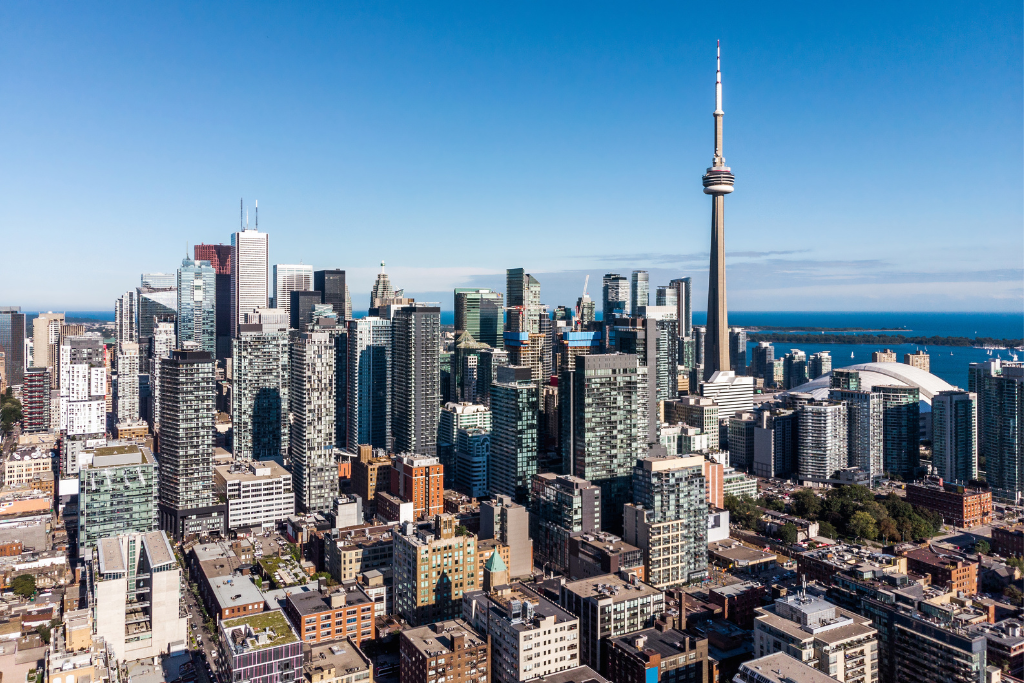1. First steps before moving to Ontario
Finding a job
Ontario is a great place to work due to its diverse industries and thriving economy. It boasts major cities like Toronto and Ottawa, as well as stunning natural scenery. With top-notch healthcare, social services, and a rich cultural scene, Ontario offers a high quality of life and excellent job prospects. Jobseekers can check websites such as LinkedIn and Indeed for a better understanding of the in demand jobs in the province.
Getting there
Below are some travel options to get to Ontario from different parts of the country, including:
Flying: Flying is the most convenient way to move to Ontario. Book a flight from your departure city to Ontario International Airport, depending on your destination within Ontario.
Train: You can also take the train with VIA Rail Canada as an alternative.
Bus: If you want another way to travel, Ontario has bus services like Busbud, and Ontario Northland, that can get you there.
Find a trusted removal company or van rental
Being able to move your entire home to a new place is one of the most stressful events in life. Finding a trusted moving company can be a time-consuming task. Save yourself time and energy by hiring a removal company or renting a van.
To find the moving company, look for good reviews, a professional-looking website and years of experience. Planning a move to Ontario? Check out some of the best moving companies in Ontario.
Local Transportation in Ontario
Public Transit in Ontario is managed by the Ministry of Transportation. The municipal transit system is divided into Conventional and Specialized services. Conventional services are those that serve the public during fixed hours. Specialized services are those that provide door-to-door transportation to individuals with disabilities or those who are otherwise eligible.
There is still quite a bit of confusion regarding the availability of ridesharing platforms like Uber in different Ontario cities. Uber is primarily available in nine cities and territories including Ottawa, Toronto, Hamilton, and a few others.
Must dos before your arrival
Moving to Ontario is an exciting yet challenging adventure, and preparing in advance can make your transition smoother:
- In Ontario, the provincial government provides settlement services to newcomers through settlement agencies. These services can be accessed by calling 2-1-1 as well. They are available before arrival, during relocation, and after settling.
- Gather all important original documents for you and your family members. Depending on your settlement location, translate these documents into English or French.
- Don’t forget to change your address with important private and government organizations.
2. Upon your arrival in Ontario
Must dos right upon your arrival
- Upon arrival, familiarize yourself with your new neighborhood by trying out the public transportation services.
- Explore community services such as settlement agencies, language programs, and cultural organizations to help you integrate into the community
- If applicable, register for educational programs or courses to improve your skills and get better career opportunities.
Exchanging your driver’s license
To get a driver’s license in Ontario, contact the Ministry of Transportation (MTO) to schedule an appointment, pay the fees, and take the knowledge and road tests at a DriveTest Centre or Travel Point (if required). ServiceOntario supplies driver’s licenses, health cards, and more, as provided by the Ontario government. Notify ServiceOntario of your new address to update your driver’s license and/or vehicle permit. Download the Ontario address change checklist to inform relevant agencies, service providers, and organizations of your move.
Setting up a bank account
Newcomers, temporary residents, and permanent residents in Canada should open bank accounts upon arrival or even before to avoid foreign currency conversion fees. While newcomers may initially use their Mastercard or Visa debit or credit cards from their home countries, it’s advisable to open a bank account in Canada with proper identification and specific documents, especially if you’re not yet a Canadian citizen or permanent resident.
RBC and TD have multiple branches to assist everyone.
Getting health insurance
Ontario, unlike most other provinces and territories, does not impose a waiting period for certain newcomers to access provincial healthcare. Upon arrival, newcomers can obtain a health card and receive free healthcare under a universal healthcare model. To apply for the Ontario Health Insurance Plan (OHIP), residents must visit a Service Ontario location with completed forms and qualifying identification documents.
With a health card, all public health services are typically free for Canadians, though certain medications and treatments may require out-of-pocket payments. Each province decides which services to include in its public healthcare insurance package.
The cost and coverage of private health insurance depend on several factors, such as your age, gender, lifestyle, pre-existing conditions, specific coverages, and the chosen provider.
| Type of healthcare | Cost |
| Employer-sponsored health insurance*It depends on the employee ages and the tier of cover. | $63.00 |
| Non-employer-sponsored health insurance | $61.32 – $196.20 |
| Gym | $70.05 |
Numbeo (Aug 2024), Hellosafe (2023) & Insurance Business (Apr 2023)
3. Best places to live in Ontario
Ontario is Canada’s busiest province because people from around the world go there for excitement in big cities and a strong economy. It can be pricey to live in Ontario but, you can still find nice, cheaper cities that are great places to live.
| City | Characteristics |
| Sault Ste. Marie | Ideal for retirees seeking tranquility |
| North Bay | Blend of natural beauty with city charm |
| Thunder Bay | Ideal for the outdoorsy |
| Chatnam-Kent | Great for retirees |
| Cornwall & District | Blend of modernity and scenic beauty |
| Greater Sudbury | Northeastern Ontario’s education hub |
| Bonus: Waterloo | Blend of career growth potential, affordable living, and sense of community. |
- Content verified by a local expert

For those moving to Ontario, consider Waterloo Region as a local alternative to Toronto. It offers a lower cost of living, a growing tech sector, and easy access to public transit. Additionally, the region’s proximity to Toronto allows residents to enjoy metropolitan amenities without the high housing costs.
Setting up home services
To ensure a seamless transition of utility services when moving homes in Ontario, follow these steps: contact your current utility provider at least five days before your move to cancel service at your old address and give notice to retailers at least two weeks in advance if you have a contract with them; identify the utilities serving your new area using the Ontario Energy Board’s resources and provide them with necessary information like your name, new address, contact numbers, and government ID a week or two before your move, specifying the desired service start date and details of other occupants; and be prepared to pay setup fees for electricity or natural gas delivery, which may require a security deposit, although this might be waived for customers in good standing for a year or more.
Did you know that smart thermostats can help you save on your energy bill?
A smart thermostat helps regulate temperature throughout the day and night to reduce energy consumption and costs. TELUS SmartEnergy is an energy management solution that provides convenient control of your smart thermostats and smart plugs in one easy-to-use app, helping you lower your household budget through energy savings.
Monitor and optimize your home’s energy use, identify consumption habits, automate energy-saving actions for your connected devices, and earn rewards by participating in energy-saving events.
Internet and mobile phones in Ontario
There are dozens of Internet Service Providers available across Ontario. Some of the most popular internet service providers in Ontario are Rogers, Bell, Cogeco, oxio or VMedia. To compare different rates, you can consult MovingWaldo to learn about the plans available at your new address.
Some of the most popular cell phone carriers in Ontario include Bell, TELUS, Fido, and Freedom Mobile. You can select a suitable carrier and cell phone plan for yourself by comparing them and checking the best internet providers in Ontario.
| Utilities | Cost |
| Basic(Electricity, Heating, Cooling, Water, Garbage) for 915 sq ft Apartment | $162.97 |
| Internet(60 Mbps or More, Unlimited Data, Cable/ADSL) | $74.42 |
| Total | $233.39 |
Should you rent or buy?
No matter where you choose to live, one of your most significant ongoing expenses will be housing prices, and this is no exception in any location. Ontario is often considered one of the most expensive provinces in the world when it comes to real estate and property prices.
Apartment rental has become pretty easy thanks to online platforms like RentBoard, RentCafé, Kijiji, and many others. In all of these platforms, you can filter your selections based on the type of property you want to rent, the neighborhood or city, and your budget. Plus, it is common practice in Ontario to hire a real estate broker to find your dream apartment, especially in the Great Toronto Area (GTA).
Below are the average property buying costs and rental fees in Toronto, the capital city of Ontario.
Cost of rent in Toronto
| Area/Neighborhood | 1-bed apartment | 3-bed apartment |
| Toronto (Outside of Center) | $2,129.56 | $3,610.16 |
Cost of buying a property in Ontario
| Area/Neighborhood | Average home price |
| Greater Toronto | $1,097,300 |
4. Cost of living in Ontario
Below are the monthly costs of living in Toronto, the capital city of Ontario.
| Category | Monthly cost |
| 1 bed apt rent outside city center | $2,129.56 |
| Groceries | $821.17 |
| UtilitiesElectricity, heating, cooling, water, garbage | $162.97 |
| Internet with 60 Mbps | $70.42 |
| Transit pass | $156.00 |
| EntertainmentMeal, taxi, movie | $113.00 |
| Gym membership | $70.05 |
| Total | $3,523.17 |
5. The weather in Ontario
Ontario experiences four distinct seasons: spring, summer, fall, and winter. Spring (March to June) is often wet and rainy, requiring rain gear. Some areas may still see snowstorms, and temperatures can fluctuate significantly between day and night and from one day to the next.
- Spring (March 20 – June 20) is characterized by increasing temperatures, rain, and cool nights. Daytime temperatures start around 8°C in March and gradually rise.
- Summer (June 21 – September 21) brings hot and humid weather, especially in July and August. Daytime temperatures often exceed 20°C and can reach above 30°C in southern Ontario. Sun safety is important during this season.
- Fall (September 22 – December 20) sees cooler temperatures, shorter days, and changing leaf colors. Early fall may be rainy, while northern areas might experience snow as early as October. Temperatures decrease gradually, requiring jackets and umbrellas.
- Winter (December 21 – March 19) is cold, with frequent snowfall across the province. Temperatures often remain below 0°C, dropping as low as -30°C. Layered clothing and hats are essential for staying warm, especially for children.
6. What to do as a local in Ontario
Once you’ve settled into Ontario, you can put your tourist hat on and explore the following sights and attractions.
- Visit Niagara Falls, undoubtedly one of Ontario’s (perhaps the world’s) the greatest gems.
- Take a boat tour of The Thousand Islands, a series of 1,800 small tree-covered islands dotting the St. Lawrence River. The location is ideal for swimming, boating, fishing, and scuba diving.
- If you enjoy theater and culture, you must check out the annual Stratford Shakespeare Festival, North America’s biggest classical repertory theater, which extends from April to October.
- Tour the Niagara Wine Trail during the warm months. This happens to be one of Canada’s two major wine regions.
- Explore Point Pelée National Park, one of Canada’s most biodiverse locations, featuring over 350 different species of migratory birds.
7. Fun facts about Ontario
- Fun Fact #1: Caribana, an annual parade held in Toronto, is the largest single-day parade in North America. The route for the parade is 3.6 kilometers long and the parade draws over a million participants and attendees.
- Fun Fact #2: Ontario stretches out for 415,000 square miles, making it larger than France and Spain combined.
- Fun Fact #3: With over a quarter of a million lakes, Ontario is home to 20% of the world’s freshwater lakes.
- Fun Fact #4: Following close behind New York and Los Angeles, Toronto is North America’s third-biggest city for film and other forms of screen production.
- Fun Fact #5: During World War II, the small town of Whitby was home to a secret school for spies called Camp X. Two of the school’s most famous students were Ian Fleming (author of the James Bond series) and Roald Dahl (celebrated author of Matilda, Charlie and the Chocolate Factory, and various other books).
Conclusion
Moving to Ontario offers a diverse range of opportunities and experiences. With its four distinct seasons, vibrant cities, and strong economy, Ontario presents a welcoming environment for individuals and families seeking new beginnings. However, it’s essential to consider factors such as job availability, housing affordability, and lifestyle preferences before making the move. Overall, Ontario’s rich cultural diversity, excellent healthcare system, and high quality of life make it an attractive destination for those looking to start afresh in Canada.
Are you moving soon? You may be searching for 5 Best Moving Companies in Toronto.





